
Everything You Need to Know About ACT Writing

The ACT Writing test, or essay section, tests your ability to read different perspectives on a topic and present your own opinion in writing. It’s the optional last section of the exam, meaning that you don’t have to take it if you don’t want to–although there are many colleges and universities that require or recommend it for admissions. Here’s what you need to know about ACT Writing in a nutshell!
What is the ACT Writing section?
Here are the need-to-know facts about the ACT Writing section :
- It’s a 40-minute test to complete with pencil and paper
- You’ll get one essay prompt about a debatable topic and three different perspectives on it
- evaluate the three different perspectives
- present your own perspective (which may agree in part or in full with any of the provided viewpoints)
- explain the relationship between your viewpoint and the provided ones.
Do I have to take ACT Writing?
Nope! It’s not a required part of the exam. You can think of it as an add-on that, yes, also costs a little bit more. But whether the test requires the essay and whether colleges do are two separate issues. While you can submit the ACT without writing to many colleges and universities, others (including most super-competitive colleges) will ask you for it. Because the list of which colleges require ACT writing is constantly changing, it’s best to check with the individual schools you’re thinking of applying to before you register.
With that said, some students do take the exam before they know where they’ll be applying to college. So in this case, is it better to do the ACT test with or without writing? If you’re really uncertain, take it with writing. This will ensure that you don’t have to go back to the test center because you’ve decided to apply to a college that does require it in a few months! Yes, it requires some extra prep–but it’s worth it to keep your options open.
How does ACT Writing scoring work?
If you’ve been prepping for the ACT overall, you’re probably very (overly?) familiar with the 1-36 scoring scale by now. But this isn’t how the ACT essay is scored! Because it’s not a multiple-choice section, the essay has its own unique scoring. Take a look!

How ACT Writing Is Scored
The writing portion of the ACT is scored by two graders, each of whom will assign you a writing score of 1 to 6 on four different writing “domains.” These domains include:
- Ideas and Analysis: does your thesis statement and writing examine the implications of the issue with clarity and nuance?
- Development and Support: do you use well-developed and specific examples to support your thesis?
- Organization: does your essay have a strong structure and a logical flow?
- Language Use and Conventions: do you use correct grammar, word usage, mechanics, punctuation, and sentence structures?
Your total points added up between these two graders are converted from these domain scores to a scaled score of 2 to 12, which is the final score you will see on your score report.
Getting Your ACT Writing Scores
So you’ve done it! You sat down, you wrote your essay…now what? When will ACT Writing scores be available? Well, you’ll get your multiple-choice scores in around two weeks, and you’ll get your ACT Writing scores (and full score report) about two weeks after that. So anticipate waiting around a month to get the total view of how you did on the ACT essay.
Can ACT Writing hurt your score?
No! Not, that is, if you’re talking about the composite ACT score on the 1-36 scale. This is an average of your 1-36 scores in each of the four multiple-choice sections (Reading, Math, English, and Science). It doesn’t take your essay score into account. In other words–does the ACT writing score affect composite scores? It doesn’t.
With that said, the essay score will affect your ELA subscore on the exam. (You can see what this looks like on a score report here .) But colleges and universities are far more interested in your sectional and composite scores.
What essay score is good?
Generally, an 8+ is an excellent ACT Writing score , but it depends on where you’re applying. Ivy-League-bound students should aim for 9 or above !
Can ACT Writing be superscored?
Nope! The ACT superscore is a way of combining your highest multiple-choice scores from different sections and different test dates to give you the highest possible combination. But it only affects your composite score . Because the essay isn’t part of your composite score, it’s not part of the superscore, either.
What happens if I mess up on the writing section?
If you’re wondering if you can cancel the section after they’ve taken it, unfortunately, the answer is no. Once you’ve written the essay, your score will appear on your score report. But if you change your mind about taking the writing section of the ACT, you can cancel it before you get into the testing room.
If you feel that you didn’t do your best, or you get a lower score than you’d like, can you retake ACT Writing? Definitely! But for the moment, ACT sectional retesting is on hold—and it may or may not include the ACT writing test being taken separately. To retake ACT Writing, in other words, you’ll need to retake the entire exam…for now.
How to Improve Your Writing Score
So how do you boost your ACT essay score? Take a look at these tips!
✅ Practice planning and writing essays on practice ACT essay prompts. Although writing full essays (preferably as part of ACT practice tests ) is the best practice, ten-minute outlining sessions in which you plan out your essay (like you will do on the test) can go a long way in helping you learn how to quickly generate and organize your ideas.
✅ If grammar is not your strong suit, check out our post on ACT grammar rules . Not only will this help you improve your grammar for the ACT essay, but it also will help you with the ACT English section !
✅ Share your writing with the strong writers you know and get feedback from them. Have them score your practice essays using the ACT rubric .
✅ Review the sample essays on actstudent.org so that you can get a sense of what kinds of essays get which scores. This can be incredibly helpful!
✅ Learn about current events and form your own opinions on them. Engage in lively debates with your friends and family so that you can practice supporting your opinions and anticipating opposing arguments!
Want even more? Read Your Magical Guide to Scoring a Perfect 12 on the ACT Essay , which will guide you through all the basics (if you’re a beginner) and how to improve your score (if you’ve already taken the test). There, you will find lots more writing tips and strategies that will help you show the ACT Writing test who’s boss. Happy Studying!

Rachel is a Magoosh Content Creator. She writes and updates content on our High School and GRE Blogs to ensure students are equipped with the best information during their test prep journey. As a test-prep instructor for more than five years in there different countries, Rachel has helped students around the world prepare for various standardized tests, including the SAT, ACT, TOEFL, GRE, and GMAT, and she is one of the authors of our Magoosh ACT Prep Book . Rachel has a Bachelor of Arts in Comparative Literature from Brown University, an MA in Cinematography from the Université de Paris VII, and a Ph.D. in Film Studies from University College London. For over a decade, Rachel has honed her craft as a fiction and memoir writer and public speaker. Her novel, THE BALLERINAS , is forthcoming in December 2021 from St. Martin’s Press , while her memoir, GRADUATES IN WONDERLAND , co-written with Jessica Pan, was published in 2014 by Penguin Random House. Her work has appeared in over a dozen online and print publications, including Vanity Fair Hollywood. When she isn’t strategically stringing words together at Magoosh, you can find Rachel riding horses or with her nose in a book. Join her on Twitter , Instagram , or Facebook !
View all posts
More from Magoosh

Leave a Reply Cancel reply
Your email address will not be published. Required fields are marked *
What are your chances of acceptance?
Calculate for all schools, your chance of acceptance.
Your chancing factors
Extracurriculars.
5 Tips to Score a 12 On Your ACT Essay
There is no question that the ACT is important for high school students who are thinking about applying to college. While the multiple choice sections are designed to assess students’ knowledge in math, English, science and reading, there is also a writing section that assesses students’ abilities to write an essay. Doing well on this section of the ACT can help distinguish you as an accomplished writer to colleges.
Though you can easily understand your score a multiple choice test, you might be left wondering what will earn you a good score on the ACT essay. If you’re aiming for a 12 on the ACT essay, read on for some tips and tricks!
What is the ACT Essay?
While the multiple choice sections of the ACT might be more unforgiving, the ACT essay is a great opportunity to show off your writing skills. According the ACT website, you should aim to write a “unified, coherent essay” in which you:
- clearly state your own perspective on the issue and analyze the relationship between your perspective and at least one other perspective
- develop and support your ideas with reasoning and examples
- organize your ideas clearly and logically
- communicate your ideas effectively in Standard written English.
To see these ideas in motion, you can take a look at a sample ACT prompt and essay here .
How is the ACT Essay scored?
The ACT essay is scored on a scale of 1 to 12. Your essay will be read and scored by two different grades on a scale of 1 to 6 in four different domains, for a total score out of 12 in each of these four domains. These four scores will then be averaged for a total score out of 12.
For more information about how this section of the test is scored, you can look at the official ACT Writing Test Scoring Rubric .
Tip 1: Know what a 12 looks like
In general, if you are aiming to do well in something, you should know what exemplary work looks like and try to emulate it. This is certainly the case for the ACT Essay, so before you walk into the testing center to write your essay, make sure you know know what essays that scored a 12 in this section look like!
Be sure to read as many sample essays as you can find—these should be available online through a quick Google search. Keep in mind, though, that the structure of the writing section changed in Fall 2015, so make sure that the examples you are looking at are current and align with the structure of the current essay prompt.
As you’re looking at essays that scored a 12, be sure to also look at essays that scored in the middle and essays that received a poor score. Try to understand what went wrong in the poorly scored essays as well as what could be improved in the middle-scoring ones. Take note of what was successful in the high-scoring sample essays that you read—what makes these essays stand out from the middle-scoring ones?
If there are notes from graders that justify the scores of the essays, be sure to pay attention to these as well. Aiming for a high score on the ACT essay section means that you need to try to understand exactly what the graders are looking for. Study the rubric once more and remember what you’ll need to accomplish in each category.
Tip 2: Pick a perspective and stick to it
When it comes to the writing prompt, the ACT website says “ The test describes an issue and provides three different perspectives on the issue. You are asked to read and consider the issue and perspectives, state your own perspective on the issue, and analyze the relationship between your perspective and at least one other perspective on the issue. Your score will not be affected by the perspective you take on the issue.”
In order to write a strong essay, you can choose whatever perspective you like—just make sure it’s one that you can support and defend effectively throughout your essay. Scorers are looking for a strong, well-organized point of view, and like it says above, it doesn’t matter whether you agree, disagree, or are somewhere in the middle; what matters is the writing.
It is important to remember that even if you don’t agree with the perspective that you’re writing from on a personal level, your essay needs to show that you can effectively argue a point. In addition, make sure to remember to relate your perspective to one of the perspectives provided in the prompt. Be sure to address the counter arguments as well in one of your body paragraphs, using the perspective opposite to your personal perspective to demonstrate your understanding of opposing views.
Tip 3: Use concrete examples
Grounding your writing in concrete examples is one extremely important element of writing effective ACT essay. You could use this as an opportunity to show off your historical knowledge by relating your argument to a relevant fact or event in history or current events, or you could come up with a rhetorical scenario or example. Including examples might even mean including a personal anecdote (although if you do end up doing this, you should make sure that your story is short and relates directly to your argument).
Take a look at the ways in which the writers of sample essays that scored a 12 managed to seamlessly incorporate examples into their writing. While you don’t have to be an expert on the essay topic, nor are you expected to be able to list off obscure facts and trivia about it, you need to make sure that your essay draws from real concrete examples rather that just vague abstract arguments.
Tip 4: Don’t be afraid to show off your language skills
One of the markers of a successful ACT essay is its use of language. This is a great opportunity to show off some of your ACT/SAT vocabulary words that you might have been studying for the English section of the test. Opt for higher-level vocabulary words when given the chance—as a general rule of thumb, you should aim to use about 1-2 higher level vocab words per paragraph.
Scorers want to see that you can navigate the English language skillfully, and so you should also take the chance to vary your sentence structure when you get the chance. Consider, also, utilizing devices such as rhetorical questions and complex sentences.
If you are going to use more complicated vocabulary and grammar structures, however, make sure you fully understand how to use them. It will reflect poorly upon your writing skills if you include a complicated word that doesn’t make sense in the context of a sentence, or if a grammatical structure that you try to use isn’t quite right. If you’re going to use a semicolon to combine two sentences, for example, make sure you understand that a semicolon is not the same thing as a comma. When in doubt, stick to what you know! It is better to have a less complicated structure that is used correctly versus an attempt at a more advanced grammatical concept that is actually wrong.
Lastly, be sure to keep it real in your writing. While scorers want to see students who are skilled in their use of the english language, it is easy to tell when someone is simply trying to electrify their vocabulary in order to titillate the reader for the written examination. Your writing and tone should reflect who you are as a writer, so remember to keep it down to earth.
Tip 5: Pay attention to timing & your energy level
For the essay section, you will get 40 minutes. This includes time for planning, writing, and editing, so make sure you dole out the appropriate amount of time for each part of the process. You can practice this by timing yourself to write an essay from a sample prompt at home. Start by giving yourself an hour, and gradually work it down to 40 minutes so that you are prepared by the time the testing date rolls around. If you find that you need more time for planning than you do writing, or if you come to learn that you need a particularly large chunk of time to edit, keep these things in mind when it comes time to write your essay for the exam.
The essay will be the last section on the test, so keep this in mind while you complete the multiple choice sections of the ACT. While you should be devoting your full attention and energy to each multiple choice section of the test, keep in mind that once you are finished with all of the multiple choice sections, you will still have to write the essay.
When you get breaks between sections, be sure to eat a snack, drink some water, and use the restroom so that you are not uncomfortable or distracted by the end of the test. While you might be tempted to just breeze through the essay section so that you can finish the ACT, know that you will not be allowed to leave the testing center until everyone has finished the test—so be sure to use up all of the allotted time!
For more information about the ACT and essay writing, check out these blog posts:
What to Bring (And Not Bring) to the ACT
10 Tips to Improve Your ACT Score
Ultimate Guide to the New SAT Essay
A Guide to the Optional ACT Writing Section
Want to know how your SAT score/ACT score impacts your chances of acceptance to your dream schools? Our free Chancing Engine will not only help you predict your odds, but also let you know how you stack up against other applicants, and which aspects of your profile to improve. Sign up for your free CollegeVine account today to gain access to our Chancing Engine and get a jumpstart on your college strategy!
Related CollegeVine Blog Posts

- SAT BootCamp
- SAT MasterClass
- SAT Private Tutoring
- SAT Proctored Practice Test
- ACT Private Tutoring
- Academic Subjects
- College Essay Workshop
- Academic Writing Workshop
- AP English FRQ BootCamp
- 1:1 College Essay Help
- Online Instruction
- Free Resources
Your ACT Scoring Guide for 2024
Act scoring: your complete guide for 2024.
Bonus Material: ACT Score Ranges for 499 Colleges
How does ACT scoring work?
Can you superscore the ACT? What does it take to get a “good” ACT score?
If you’re starting your ACT test prep, you’ve probably asked at least one of these questions.
The ACT is a vastly different test than the SAT, the other college entrance exam. It has different sections and time constraints. It especially has a different scoring system, which can feel foreign to first-time test-takers.
We’re here to break down everything you need to know about ACT scoring in 2022 so you can jump into this test feeling confident and prepared.
We also give readers access to the ACT Score Ranges for the top 499 U.S. colleges and universities, a great resource for those establishing their target ACT scores. Grab this below.
Download ACT Score Ranges for 499 Colleges
Here’s what we cover in this post:
- How the ACT is Scored
Which Scores Matter Most to Colleges in 2022
- Superscoring the ACT
- What Counts as a Good ACT Score for 2022
- ACT and SAT Score Comparison
- Bonus: ACT Score Ranges for 499 Colleges
ACT Scoring 101
The ACT has 5 sections, in this order:
- Essay ( optional )
Every section except the ACT essay is scored on a scale of 1-36. 1 is the lowest score you can achieve on an individual section, while 36 is the highest score possible.
| English | 1-36 |
| Math | 1-36 |
| Reading | 1-36 |
| Science | 1-36 |
Students also receive an ACT total score, called the composite score . This is the average of the scores received on the four required ACT sections.
Take a look at this sample student ACT score report to see this scoring system in action.
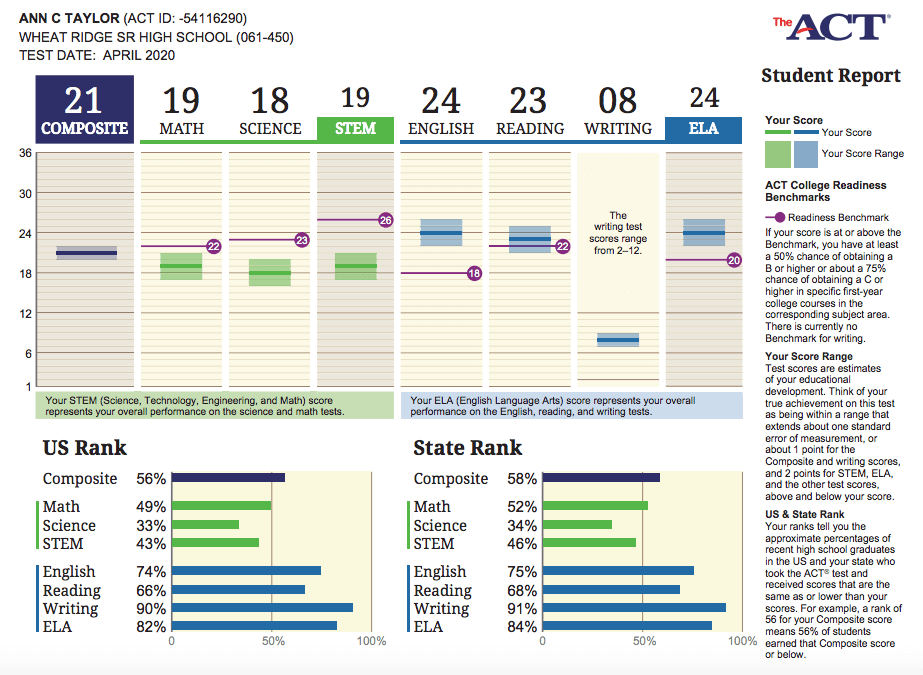
Here, the student’s composite score of 21 is the average of the student’s individual ACT section scores (19, 18, 24, and 23). If this average equates to a decimal, such as 20.8, ACT will round to the nearest whole number , which would be 21 in this case.
What about the ACT Essay score?
The student’s ACT essay (also referred to as Writing) scores do not impact their ACT composite score and fall on a range of 2-12. This number is the sum of two essay readers’ scores, which are assigned in 4 domains:
- Ideas & Analysis
- Development & Support
- Organization
- Language Use & Conventions
You can find the detailed rubric that ACT essay readers use here .
If you do not take the ACT essay, you will not see a score reported in the “Writing” column. Nor will you see an English Language Arts (ELA) score.
What are ranks?
As you can see in the sample ACT score report above, reports also include information about a student’s “ranking” in the U.S. and that student’s home state. These are approximate percentages of recent grads who have taken the ACT in the U.S. and your state and achieved the same score as you or lower.
The ACT offers these rankings for your composite score, individual section scores, and STEM/ELA scores.
These rankings can be helpful from an assessment perspective. But when it comes to the numbers colleges care about, they aren’t as essential.
What are college readiness benchmarks?
Your score report will also show how your scores relate to what ACT calls “College Readiness Benchmarks,” indicated by a purple line within each scoring column. These are scoring benchmarks designed to predict success in college-level courses.
In this sample score report, the student is below these benchmarks for Math and Science. She is above the benchmarks for English and Reading.
Here are the benchmark ACT scores for college readiness as of 2022:
- English: 18
- Math: 22
- Reading: 22
- Science: 23
How does ACT calculate my score per section?
Every ACT section has different content and different numbers of questions. So how does ACT boil each down to a number on a scale of 1-36?
Basically, they’ll tally up the number of questions you got correct on a section, called your raw score . They then convert these raw scores for each section to a number between 1-36 using a specific scaled conversion table, like the one below.
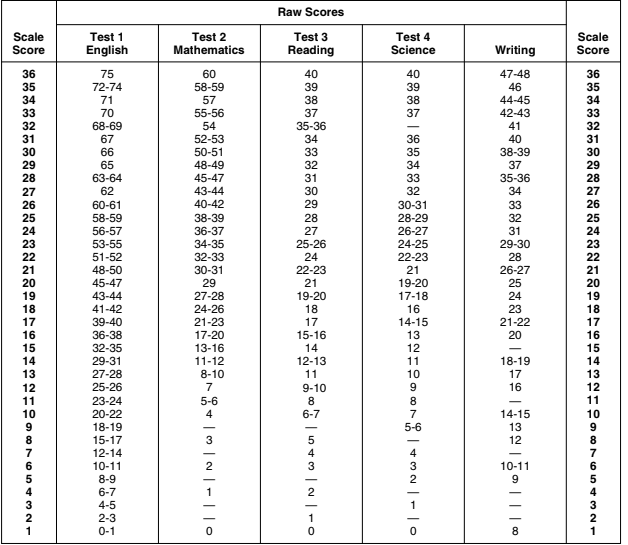
If you got 31 questions correct on the ACT Science section of this test, for example, this would yield a 26 sectional score. 50 correct questions on ACT Math on this test equates to a 30.
Is a 36 on one ACT exactly the same as a 36 on another ACT?
Not necessarily.
No two ACTs are alike. They will vary in difficulty, so ACT uses a process called “equating” to balance these discrepancies. The company doesn’t say much about what goes into the equating process, but we can see it at work if we look at sections from the raw score conversion charts for 2 official ACT practice tests.

To get a 30 on ACT English on Practice Test #1, a student must get 65 questions correct. But to get a 30 on ACT English on Practice Test #2, a student has to ace 66 questions.
This might seem like a subtle difference, but take a look at Math. 49 Math questions correct on Practice Test #1 yields a 30, while 51 equates to a 30 on Practice Test #2.
These differences can add up!
Can you predict when ACT will administer an “easy” test?
Nope. While taking the test, you might be able to sense if a section feels harder or easier than other official practice tests.
But there’s no viable way to predict an “easy” ACT. What’s more, an “easy” ACT does not necessarily equate to an easy perfect score! Easier sections often require students to get more questions correct to earn a higher score.
What scores will colleges prioritize when they look at your score report? Your composite? Each section score? Your Essay score? Your ACT rankings?
In a nutshell, colleges are going to care most about your ACT composite score . But they will also likely place a heavy emphasis on your ACT section scores.
That’s why we encourage students to work on maximizing their scores in all 4 sections of the ACT. Doing so will also positively impact their composite score, as the composite is the average of all 4 section scores.
Schools have different policies regarding how they assess ACT Essay scores. Because fewer and fewer schools are requiring the ACT Essay, it’s safe to say that most schools will only assess these Essay scores for advising purposes (if at all).
You can learn more about how specific colleges on your list review ACT score reports by checking out what they have to say about standardized tests on their websites.
Bates College , for example, while test-optional, actually specifies the Middle 50% of successful applicants’ test scores on its website. It also states that it superscores the ACT and SAT, which we discuss in the next section.
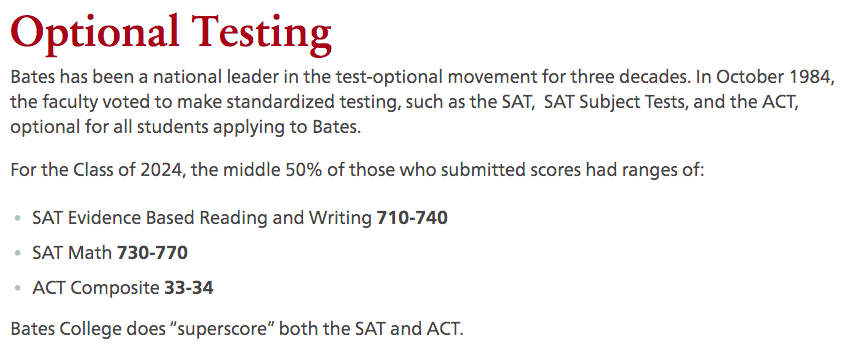
We’ve compiled the ACT score ranges of successful applicants to the top 499 U.S. colleges and universities in one easy-to-read document! Download a copy below.
Can You Superscore the ACT?
Yes! The ACT recently launched superscoring . Superscoring allows ACT test-takers to count their highest section and composite scores as official scores. Colleges ultimately have the final say in how they review these scores, but superscoring can be a valuable tool for students who plan on taking the ACT at least twice.
As we saw with Bates College above, many colleges already have their own superscoring policies in place.
They should elaborate on their website what these policies look like, which can vary widely. Some require submission of all test scores, for example, while others might only consider the highest scores submitted.
Here’s what Stanford says about superscoring on its website:

To make the most of superscoring opportunities, students should plan on taking the ACT at least twice.
Some students worry that taking the ACT two or three times may reflect badly on their college applications. This couldn’t be farther from the truth!
Most students take the ACT at least twice, and many experience a score increase the second or third time around. There is no evidence to suggest that taking the ACT more than once impacts the college admissions decision.
What is a Good ACT Score for 2022?
Most students assume that because 36 is the highest possible ACT score (both composite and individual), it’s a “good” ACT score.
Yet while a 36 will definitely add a competitive edge to an application, anything less than a 36 isn’t necessarily a bad ACT score.
In fact, it all comes down to how you define a “good” ACT score . We have 2 definitions for this.
- “Good” is anything that is “above average” with sectional scores and percentile rankings
- “Good” is anything that will look competitive on a college application
Let’s start with the first definition.
Good ACT Score #1: The “Above Average” ACT Score
ACT regularly releases a “National Norms” report for ACT scores . This includes data from all ACT test scores reported for the 2023-2024 period (although these scores could be from 2021, 2022, and 2023 class graduates).
The most recent National Norms ACT Report includes the average section and composite scores of those reported between 2022 and 2023.
Here’s what they are:
| ACT Section | |
|---|---|
| English | 19 |
| Math | 19.4 |
| Reading | 20.5 |
| Science | 20 |
| 19.9 |
Using the first definition of a “good” ACT score, a composite score of 20 or higher on the ACT could be considered a competitive score for 2023.
At the very least, we encourage students who are new to the ACT to aim for a target score that is above national averages, on individual sections and the whole test itself.
This would mean establishing a goal score of the following on each section:
| Section | Goal Above-Average Score |
|---|---|
| English | 20 |
| Math | 20 |
| Reading | 21 |
| Science | 21 |
Of course, your starting score may be higher than a composite of 21, so we also recommend that students start with a diagnostic ACT to see where they currently stand.
Good ACT Score #2: The College Competitive ACT Score
Of course, scoring above-average on the ACT is just one interpretation of what it means to do well on the test.
In the context of college entrance, one student’s “good” ACT score could be vastly different than another student’s. It just comes down to where you are applying and the average ACT scores of admitted applicants.
So, we like to say that, under this definition, a ‘good ACT score’ is the one that is right for you given your college aspirations. This will probably be close to the ACT scores of admitted applicants.

Plenty of universities specify ACT score ranges of successful applicants on their websites (although some are not public with this information).
Most do so by specifying the ‘Middle 50,’ or the 25th and 75th percentile of accepted students’ ACT scores.
Here’s a sampling of the Middle 50s from various elite institutions:
| Yale University | 33 | 35 |
| Vanderbilt University | 33 | 35 |
| Amherst College | 30 | 34 |
| Pomona College | 32 | 35 |
| Princeton University | 33 | 35 |
| Brown University | 33 | 35 |
| Barnard College | 31 | 34 |
Source : The National Center for Education Statistics IPEDS (2019)
And here are the Middle 50s of ACT score ranges of successful applicants to the top 499 U.S. colleges and universities.
If the colleges on your list do not specify these score ranges on their websites, you can check out the Common Data Set, an effort to give clear, relevant information to everyone involved in the college admissions process about universities’ “institutional priorities.”
What are institutional priorities? These refer to what a college cares about when it’s admitting an incoming class.
The Common Data Set for Princeton University , for example, contains information about the university’s enrollment, admissions, financial aid, and more. A school’s CDS should also include details about test scores of admitted applicants, as Princeton’s shows here:

Princeton’s CDS also breaks down ACT scores into 25th and 75th percentiles. You can use these percentiles to understand competitive scores of admitted applicants.

For example, one can safely conclude based on this CDS that 50% of admitted applicants to Princeton in 2022-2023 had ACT composite scores ranging from 34 to 35.
SAT and ACT Score Comparison
How do ACT scores compare to SAT scores?
The two college entrance exams are pretty different. But it is possible to figure out what an ACT score generally aligns with on the SAT, and vice versa.
In fact, in 2018, ACT and the CollegeBoard completed what’s called a “Concordance Study,” which examined the relationship between ACT scores and SAT scores. ACT emphasizes that this study does not “equate scores” but can be a “helpful tool for finding comparable scores.”
Translation: It’s impossible to pinpoint exact equivalences, but it is possible to approximate.
Here is one of the score comparison tables that resulted from this study, which compares ACT Composites to SAT Composites. Notice how this table also includes an “SAT Range,” designed to compensate for fluctuations in test difficulty.

ACT also has a digital tool on its website that allows for quick score comparison calculations:
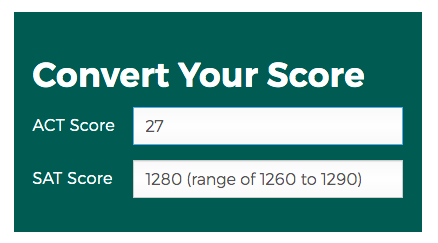
Ideally, students should choose one test to prepare for as they plan their college application journey. All U.S. colleges accept both tests equally. Not sure which test is the best fit for you? We can help .
Download ACT Score Ranges of 499 Colleges
Curious about what ACT score you need to get into your dream school?
We’ve compiled the ACT score ranges of successful applicants to the top 499 U.S. colleges in one simple document, which you can download for free below!
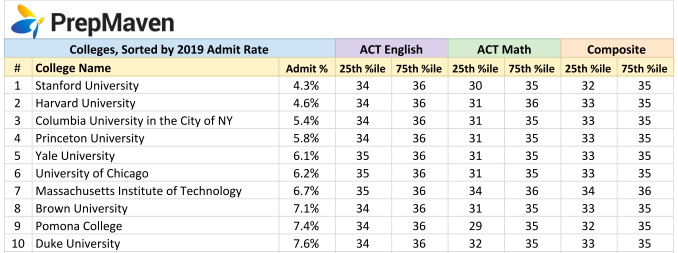
Here’s what you’ll get with this handy resource:
- Middle 50 ACT composite scores for the top 499 U.S. colleges and universities
- Middle 50 ACT sectional scores for English and Math
- Admit rate for each college
- All based on the most recent available data (2019)

Kate is a graduate of Princeton University. Over the last decade, Kate has successfully mentored hundreds of students in all aspects of the college admissions process, including the SAT, ACT, and college application essay.
CHECK OUT THESE RELATED POSTS

What is SAT Superscore? Your 2024 Guide
January 3, 2024
What does it mean to superscore the SAT? What is Score Choice? We answer these questions and more in this post!
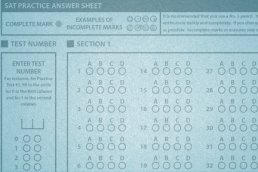
12 Free Official SAT Practice Tests (Including Digital SATs)
August 2, 2022
Find everything you need to self-administer a full-length SAT test - 8 Official SAT Practice Tests, blank answer sheets, and proctoring instructions.
Privacy Preference Center
Privacy preferences.

- ACT Exam Info
- What's Tested on the ACT
- What's a Good ACT Score?
- ACT Test Dates
- ACT Math Tips and Tricks
- ACT English Tips and Tricks
- ACT Reading Tips and Tricks
- ACT Science Tips and Tricks
- Applying to College
- ACT Question of the Day
- ACT Pop Quiz
- ACT 20-Minute Workout
- Free ACT Practice Test
- ACT Prep Courses
What to Expect on the ACT Essay
Understanding the act essay prompt, how the act essay is scored, ideas and analysis.
This domain evaluates your ability to analyze multiple perspectives (yours and one of the given perspectives). To score highly in the Ideas and Analysis domain, your argumentative essay should contain a clear thesis statement and address the complexity, underlying assumptions and implications of the perspectives you have chosen to write about.
Development and Support
This domain evaluates your ability to support your point of view. To score highly in Development and Support, your must support your ideas with examples and logical reasoning. Be sure to convey the significance of your argument as well as address an alternative perspective in a way that ultimately bolsters your position.
Organization
This domain evaluates your ability to craft a well-designed essay. To score highly in the Organization domain, your essay should include introduction and conclusion paragraphs, a thesis statement, topic sentences as well as transitions both between paragraphs as well as sentences as appropriate.
Language Use and Conventions
This domain evaluates your ability to communicate your ideas using the conventions of written English. To score highly in the Language Use and Conventions domain, your word choice should be accurate and precise, you should use synonyms and pronouns as appropriate to vary your word choice, use proper sentence structure and write with a tone that matches the nature of your argument. Minor spelling or grammar errors that do not hinder the reader’s ability to understand your argument do not count against you.
You might also like

Call 1-800-KAP-TEST or email [email protected]
Prep for an Exam
MCAT Test Prep
LSAT Test Prep
GRE Test Prep
GMAT Test Prep
SAT Test Prep
ACT Test Prep
DAT Test Prep
NCLEX Test Prep
USMLE Test Prep
Courses by Location
NCLEX Locations
GRE Locations
SAT Locations
LSAT Locations
MCAT Locations
GMAT Locations
Useful Links
Kaplan Test Prep Contact Us Partner Solutions Work for Kaplan Terms and Conditions Privacy Policy CA Privacy Policy Trademark Directory
How Does the ACT Work, and What’s a Good Score?

[et_pb_section bb_built=”1″][et_pb_row][et_pb_column type=”4_4″][et_pb_text _builder_version=”3.10″]
The ACT is one of the two main college readiness exams. Like they do with the Scholastic Aptitude Test (SAT), admissions offices use your ACT score to help determine if you’re a good fit for their college or university.
Both tests are widely used, but recently, the ACT has become more popular than the SAT. Over two million students take the ACT every year, while about 1.7 million take the SAT. It’s easy to feel like all standardized tests are the same, but these tests measure two different things.
The SAT measures your ability to learn, and the ACT measures what you’ve already learned. They’re two completely different approaches to determining your “college readiness,” but both are well-respected, and most schools don’t have a preference for one or the other.
The ACT was developed by a college professor in response to his frustrations with the SAT, which at the time was the only means of gauging how prepared students were for college. As an educator, he felt it was far better to know that your students had the necessary prerequisite knowledge than to know how good they were at learning.
Tomato, to-mah-to, you’re taking the ACT. Here’s what you need to know about it.
Quick facts on the ACT
Eligibility requirements: none
Length: three hours and 30 minutes
Sections: four required (English, math, reading, science), one optional (writing)
Number of questions: 215 (plus an essay prompt)
Types of questions: multiple choice, essay (writing section only)
Score range: 1–36
Cost: $46 without the writing section, $62.50 with the writing section
What does ACT stand for? ACT technically stands for American College Testing, but the test is administered by an organization of the same name, and they simply refer to it as the ACT.
What does the ACT test you on?
The ACT tests you based on things you should learn by the end of your senior year of high school. We’ll tell you what to expect from each section and give you some tips, but first, here’s a tip that applies to every multiple choice section:
Never leave a question blank. You aren’t penalized for wrong answers, so even if you have absolutely no clue what the answer is, take a guess!
ACT English Test
Length: 45 minutes
Number of questions: 75
The English section of the ACT will measure your mastery of the nuts and bolts of prose. Rather than asking you to retrieve information or think critically about a passage, you’ll examine individual phrases, sentences, or paragraphs.
The makers of the test say that the English section “measures your understanding of the conventions of standard English (punctuation, usage, and sentence structure), production of writing (topic development, organization, unity, and cohesion), and knowledge of language (word choice, style, and tone).”
There are several varieties of multiple choice questions, but they’re all based on passages. If a passage has underlined sections, some of the questions will ask you to improve those parts with one of the options provided. If none of the suggested changes improve the passage, you can choose “no change” (this is pretty common).
You may be asked to change a passage to create a specific effect, like building a stronger transition between two thoughts or rearranging sentences to form a more logical progression. You’ll also be asked about how particular changes might affect the passage, or what information a particular section provides.
According to national data from the ACT, this is the section most people score lowest on.
Tip: This test gives you the least amount of time per question, so don’t waste time on tough questions. Guess, and come back to them later if there’s time.If you don’t have extra time at the end, think about how many more questions you were able to get through! It’s sunk-cost economics at work.
ACT Mathematics Test
Length: 60 minutes
Number of questions: 60
All of the questions of the math section of the ACT are solvable without a calculator. Still, using one could save you some precious time. Here’s how the makers of the test break down the questions:
- Number and quantity (7–10%)
- Algebra (12–15%)
- Functions (12–15%)
- Geometry (12–15%)
- Statistics and probability (8–12%)
- Modeling (less than 25%)
- Integrating essential skills (about 15%)
You’ll need to know the basic terminology and formulas for basic high school math. Be sure to read how the ACT describes each math section .
The ACT has already done a huge favor for you: the questions in each section appear in order of difficulty, so the easiest ones come first. That doesn’t always mean they’ll be the easiest ones for you , so you’ll still want to skim ahead if you get stuck on one.
Tip: Before you start solving a problem, take a look at the possible answers. They may help you decide how to approach the problem.
ACT Reading Test
Length: 35 minutes
Number of questions: 40
The reading section of the ACT contains four passages with 10 questions each. These are designed to test your reading comprehension, and the questions will ask you to summarize pieces of the passage, make inferences from the text, and identify key information. The bulk of the questions will be about the ideas and details in the passages.
The four passages come from the same four subjects every year, and they always appear in the following order:
- Social science
- Natural science
According to national data from the ACT, this is the section people score highest on.
Tip: Answers on the reading section are deliberately trying to trick you. There may be multiple answers that look correct. Before you read the possible answers, try to answer the question for yourself when possible. Then it’ll be harder for those almost right answers to mislead you—because you’ll be looking for a specific answer.
ACT Science Test
For the science section of the ACT, you won’t be expected to have advanced knowledge of any particular kind of science, but you will need a general understanding of these subjects:
- Meteorology
The majority of this test involves interpreting data and working with experiment results. Like the reading and English sections of the ACT, science questions are based on a passage. You’ll have between four and seven questions per passage.
The passages you’ll work from will take these three formats:
- Data representation (30-40%)
- Research summaries (45-55%)
- Conflicting viewpoints (15-20%)
Data representation questions will focus on tables and graphs, and they’ll test your ability to interpret scientific data.
Research summaries will focus on experiments, and you’ll be asked about the design of the experiment and the conclusions drawn from the results.
Conflicting viewpoints questions ask you to analyze and compare two hypotheses or views that are based on different premises or incomplete data.
ACT Writing Test
Length: 40 minutes
Number of questions: one
The writing section is the only part of the test that doesn’t affect your composite score. (It is optional, after all.) The test will present three perspectives on an issue, and you’ll respond with an essay.
Regardless of the prompt, your essay will have the same three expectations:
- Analyze and evaluate the perspectives given.
- State and develop your own perspective on the issue.
- Explain the relationship between your perspective and those given.
Should I take the ACT Writing Test?
It definitely won’t count against you if you don’t take the optional section of the ACT. So if you’re a terrible writer, that’s probably a good choice. However, since it doesn’t count towards your composite score, and it can provide the admissions office with a more personal representation of your academic capabilities, it’s a good idea to take it.
A big shiny ACT score can certainly make your college applications stand out, but people can only learn so much about you from a number. There’s no guarantee a college will use your ACT essay, but if you’re a good writer, this is a positive differentiator that not every applicant is going to have.
Personally, I’d recommend it.
How do ACT scores work?
On the ACT, you gain points for correct answers, and you don’t lose points for incorrect answers.
You’ll receive a separate score for each section of the ACT: English, math, reading, science, and writing (optional). Scores range from 1 to 36 on each section—with the exception of the writing section, where scores range from 2 to 12. These scores are averaged into your “composite score.”
Your score report will show your score and percentile in each section, plus two additional sections: STEM , and ELA (English Language Arts). These are good indicators of your competency in specific subjects, but when someone says, “What’s your ACT score?” they’re asking about your composite score. ACT.org can walk you through each part of your ACT score report .
You’ll be able to view your scores online about two weeks after the exam, and you’ll get your score report in the mail within 2-8 weeks.
What’s a good ACT score?
While a perfect SAT score is 2,400, a perfect ACT score is just 36. But less than .1% of all ACT test-takers get a perfect score. So what’s a good ACT score?
The average ACT score is 21. But sitting smack dab in the middle isn’t going to make your application stand out. And for schools that want to build on their reputation for excellence, a mediocre score may not be good enough (unless you have an exceptional portfolio or something else to show off).
A good score is different for every school
Unless a school explicitly states a minimum ACT score you need to be admitted, you have to look at the students who are actually accepted to determine a “good score.” Whatever schools you’re looking at, you can see the range of standardized test scores for students they’ve accepted. You can even compare the bottom 25% of accepted students and the top 75%. If the other pieces of your application are strong, you can probably get by with a lower score.
Ivy League schools , for example, have significantly higher standards than the national average, and their students’ average ACT scores range from as low as 29 to as high as 35 (or from the 92nd percentile to the 99th).
So a good score really depends on what school you want to go to. But unless you’re looking at a top-tier school—one with a notoriously low acceptance rate—scoring in the top 75% of all test takers should be good enough for most schools. That means a good score is 24 or higher.
But what do you mean by “a good score”?
Of course, good is a relative term. Maybe by “good” you mean scoring in the top 90%? In that case, you’re shooting for a 28 or higher. And yes, four points can make that big of a difference. Sometimes getting a single point higher on your composite score can make a difference of 7%.
While a score around 24 should get you into most schools, scoring 28 or higher will have some schools throwing money at you, begging you to be one of their students.
Now that you know more about what to aim for, let’s talk about what to do with a bad score.
What happens if you get a bad score on the ACT?
No matter how much you study, there are lots of factors that can add up to a bad test day. Lack of sleep, poor diet, not exercising regularly, health issues, stress, and distractions make it harder to perform your best under pressure.
Thankfully, you can retake the ACT as many times as you want. And ACT.org says that 57% of people who retake the ACT improve their score.
When it comes time to submit your ACT score to a school, you can choose to submit your highest composite score. So if you have a bad test day, no one even has to know. This doesn’t mean you can pick and choose your best results from each section, though. If you did really well on different sections on different days, you may want to share both scores—but you can’t blend them into a new composite score like some kind of ACT Frankenstein.
How do you prepare for the ACT?
Like all standardized tests, the best way to prepare for the ACT is to take practice tests. You should certainly study the terms and concepts you’ll need to be familiar with (especially for the math and science sections), but when it comes down to it, practice is the best route to a high score.
The best practice tests will give you explanations for why one answer is correct, and the others are wrong. To make sure you’re getting the most relevant practice, be sure to check out the materials provided by ACT.org, the makers of the test.
Here are some free practice questions they provide, with explanations for each answer:
- English practice questions
- Math practice questions
- Reading practice questions
- Science practice questions
- Writing samples
Let us know in the comments if there’s anything else you wish we would’ve told you about the ACT. Good luck in your studies!
[/et_pb_text][/et_pb_column][/et_pb_row][/et_pb_section]
Spread the word:
You might also like
Does ACT cater for students with any form of learning disability? For instance this student is able to write ACT but would need special accommodation, like additional time, would such special accommodation be allowed for the ACT exam? This student has a condition called Impaired Processing Speed (IPS). An official report to that effect can always be forwarded to the relevant office of ACT when and if necessary.
I kindly await your advice.
Yes, the ACT offers accomodations for documented learning needs. Here’s where they talk about that: https://www.act.org/content/act/en/products-and-services/the-act/registration/accommodations.html
Leave a Comment Cancel reply
Your email address will not be published. Required fields are marked *
Save my name, email, and website in this browser for the next time I comment.
Notify me of follow-up comments by email.
Notify me of new posts by email.
Privacy Overview

Can someone please explain how the ACT writing score affects the composite?
<p>I know the writing is scored separately and does not count toward the composite, but how does the combined english/writing score affect the score, if so at all? what is the point of it if it doesn’t count in the composite?? can someone please clarify? thanks!</p>
<p>It doesn’t.</p>
<p>Essay is almost like a little extra. I don’t think colleges take note of it much, as long as it is decent. The SAT requires an essay and so I think the ACT guys were trying to make it more “official” in a sense by implementing the essay. To clarify the essay is scored out of 12 and is added to your english score to create a separate subsection score from your other scores. This score does not affect your composite.</p>
<p>^Does it really matter? Can colleges even see your essay score?</p>
<p>Although the writing score does not affect the composite, it does matter, and the colleges do see it. For one thing, the official conversion from ACT to SAT is to convert the composite to SAT CR+M, and the English/Writing to SAT Writing. For example, ACT composite 35 = SAT CR+M 1560, and ACT English/Writing 34 = SAT Writing 770. So, a student with those ACT scores would have an equivalent SAT score of 2330. Of course, not every college uses this official method, but the point is they do see your essay score.</p>
<p>By the way, yes, the ACT English score seems to be “counted twice” in the SAT conversion, but that’s just how it is.</p>
Get the Reddit app
A forum to discuss the ACT and forms of preparation for taking the test.
Does act essay score matter?
I got 36 act but 8 essay. Does that affect me a lot?
Watch CBS News
We may receive commissions from some links to products on this page. Promotions are subject to availability and retailer terms.
Here's how a 2024 Fed rate cut will affect home equity loans
By Aly Yale
Edited By Matt Richardson
July 8, 2024 / 12:11 PM EDT / CBS News

Inflation has been cooling in recent months, and if it continues on that path, it could mean lower interest rates are upcoming. Once inflation gets closer to the Federal Reserve's 2% goal, it's likely to reduce its federal funds rate , which would lower rates for American borrowers, too.
The timing of that rate cut is unclear, but according to the CME Group Fed Watch tool , it could be as early as September. What would that rate mean for home equity borrowers, though? And when would those changes hit? We asked some experts for their thoughts on how a Fed rate cut could affect home equity loans.
See what home equity loan rate you could secure here now .
How a 2024 Fed rate cut will affect home equity loans
Here's what the experts we spoke to predicted for home equity loans, should the Federal Reserve proceed with a cut to the federal funds rate.
The Fed will only cut rates slightly
In its June Summary of Economic Projections , the Fed indicated it will likely only reduce rates by about 0.25% this year. And the experts we spoke to agree that this is probably where the Fed will land by year's end.
"The Federal Reserve has made it clear that it needs to see more data supporting an inflation trend towards its long-term goal of 2% before making any meaningful changes to monetary policy," says Kelly Miskunas, senior director of capital markets at online mortgage lender Better.com.
The CME Group Fed Watch tool shows the possibility of further rate cuts this year, but the numbers change often. If inflation drops at a faster clip than it has in recent months, there's a chance those extra cuts could happen. The Fed meets next at the end of July.
See how much home equity you could access online today .
Home equity interest rates will drop, too
Experts say if the Fed drops its rate, home equity rates will fall, too. They'll fall quickest on home equity lines of credit ( HELOCs ), as these have variable interest rates that are directly tied to the prime rate. When the Fed rate declines, the prime rate does, too, so HELOC rates fall in step.
That means new HELOC will see the impact immediately, and borrowers who already have HELOCs will see it shortly after.
"Outstanding HELOCS typically are set monthly," says Kevin Leibowitz, a mortgage broker at Grayton Mortgage in New York. "It will take 30 to 45 days for those mortgages to reset."
For home equity loans , though, the story is a little different. Most borrowers with existing home equity loans won't see their rate change at all (those are usually fixed-rate loans, so the rate stays constant the entire term unless refinanced ). New home equity loan borrowers, though, will see lower rates when they take out their loans. It likely won't be a huge decline, though.
"The Federal Reserve tries to be overly transparent with their intentions for future policy decisions to not spook broader markets," Miskunas says. "For this reason, the market will typically have priced in the Fed's next action before it occurs."
Should you act now or wait?
With rates poised to fall, you might be tempted to wait before taking out a home equity loan or HELOC. Whether that's smart or not depends on your goals (do you need the money for something important right now?), as well as what type of product you're considering.
"Waiting for a lower rate for most HELOCs is not necessary because they are floating, so when the rates drop, your loan rate will automatically fall," says Mason Whitehead, branch manager at Churchill Mortgage in Dallas. "Just ensure that your loan does not have a floor rate, which means it will never go below a certain rate, typically the start rate."
For home equity loans , waiting might work — but there's really no guarantee. And if you need the cash for something now, acting sooner may be necessary.
"Since it is impossible to predict the future path of interest rates, customers who are looking to tap into their home equity today should act, instead of trying to time the market," Miskunas says. "Borrowers can always look to refinance high-cost debt if interest rates decline in the future."
How to get a lower rate
If you're applying for a home equity loan or HELOC soon, there are steps you can take to minimize your interest rate. To start, improve your credit score . The higher your score, the lower your rate will likely be. You can also reduce your debts or increase your income, as this lowers your debt-to-income ratio (DTI) and the risk you pose to a lender. A lower DTI can also get you a lower rate.
Finally, talk to a loan officer or mortgage broker early in the process. They can help you prepare for your application and guide you on how to get the best rates.
Find out more about your home equity borrowing options here today .
More from CBS News

Is a home equity sharing agreement a good idea? Here's what experts say

These are the 5 best strategies for investing in CDs right now, experts say

Mortgage rates are still falling. Here are 5 big moves to make now

Gold prices are near a new record high. 3 savvy moves to make now
- Cover Letters
- Jobs I've Applied To
- Saved Searches
- Subscriptions
Marine Corps
Coast guard.
- Space Force
- Military Podcasts
- Benefits Home
- Military Pay and Money
- Veteran Health Care
- VA eBenefits
- Veteran Job Search
- Military Skills Translator
- Upload Your Resume
- Veteran Employment Project
- Vet Friendly Employers
- Career Advice
- Military Life Home
- Military Trivia Game
- Veterans Day
- Spouse & Family
- Military History
- Discounts Home
- Featured Discounts
- Veterans Day Restaurant Discounts
- Electronics
- Join the Military Home
- Contact a Recruiter
- Military Fitness
Disabled Veterans to Congress: Move Out on Stalled Bill to Allow Payment of Both Retirement and Disability Benefits

Veterans with combat-related injuries rallied near the U.S. Capitol on Wednesday to urge lawmakers to finally act on a long-stalled proposal to allow all veterans full access to military retirement pay and Department of Veterans Affairs disability benefits.
Despite wide bipartisan backing, the Major Richard Star Act has languished for years, increasingly frustrating the veterans who are losing thousands of dollars in benefits that could help them support themselves and their families.
"Even before I medically retired, I got another job because I needed to provide for my wife, and at that time, we welcomed our first child right after I retired," said Ryan Kules, an Army veteran who lost his right arm and left leg in an improvised explosive device blast in Iraq in 2005. "So, I had a growing family and needed to get back into the workforce. And if I had had that additional income that I had earned, I would have been able to take some more time to adjust, but I didn't have a choice."
Read Next: Commander of New Hampshire Air National Guard Killed in Hit-and-Run Incident Near His Home
Kules, who now works at Wounded Warrior Project, was speaking to Military.com after a news conference across the street from the Capitol hosted by his organization and other veterans groups to urge Congress to move on the Major Richard Star Act.
Specifically, the organizations called for the measure to be added to the Senate's annual defense policy bill as an amendment when the chamber takes up the legislation in the coming weeks.
Right now, veterans with fewer than 20 years of service and a disability rating of less than 50% have their retirement pay reduced by a dollar for every dollar of disability pay they get.
Those rules mean an estimated 50,000 retirees are ineligible for concurrent benefits. The average offset was about $1,900 per month in 2022, according to the Congressional Budget Office.
The Major Richard Star Act would remove those restrictions so that all retirees with combat-related disabilities can collect their full retirement and disability benefits.
The bill's namesake was an Iraq and Afghanistan veteran who was forced to retire before 20 years of service after he was diagnosed with lung cancer he developed following burn pit exposure. Star died from cancer in 2021.
The bill has more than 300 co-sponsors in the House and more than 70 in the Senate. But it remains stalled despite past efforts to build momentum , in large part because the legislation would increase what's known as mandatory spending and congressional rules generally require any increases in mandatory spending to be balanced out elsewhere in the budget.
But Senate Veterans Affairs Committee Chairman Jon Tester, D-Mont., called the mandatory spending debate "an excuse" for inaction.
"This is the cost of war," Tester said at Wednesday's new conference. "You heard a number of folks come up here, you saw their battle wounds. If that shouldn't be mandatory spending, what the hell should?"
Tester said he and Sen. Mike Crapo, R-Idaho, the bill's other lead Senate sponsor, will introduce the measure as an amendment to the National Defense Authorization Act later this week.
It remains to be seen whether the amendment will be voted on, but veterans argued Wednesday that it's long past time for Congress to act.
"We've been talking about this for 19 years amongst the veterans, my brothers and sisters," said Danielle Green, an Army veteran who lost her dominant left arm in a rocket-propelled grenade attack in Iraq 15 months after enlisting. "I've been very fortunate over the past 20 years that I've been able to move forward with my life, but there are thousands, we have 53,000 veterans that earned these benefits that could benefit from this that have endured in hardship. So, we got to make this right, Congress."
Related: Bill Allowing Disabled Veterans to Collect Full Benefits Gets New Push from Supporters on Capitol Hill
Rebecca Kheel

You May Also Like

The National Guard is providing around 1,700 Guardsmen, as well as a small number of active-duty troops, but that the effort...

David Dutch is a Marine Corps veteran who served during the Gulf War, according to his service record, which was provided to...

House Armed Services Committee Chairman Mike Rogers and other committee Republicans sent a letter to Army Secretary Christine...

Senator J.D. Vance was elected to the Senate in 2022 and has become one of the staunchest champions of the former president’s...
Military News
- Investigations and Features
- Military Opinion
Select Service
- National Guard
Most Popular Military News

A full day after the shooting, the gunman's motive remains a mystery.

Military.com spent several months trying to unearth what existing safeguards and policies are in place to protect what has...

Although constrictive bronchiolitis was one of the first diseases associated with exposure to burn pits, the pathway for...

The doctrine, titled simply "Deception," was published late last month and supersedes a manual from 12 years ago, according...

Public Pennsylvania court records show no past criminal cases against Thomas Matthew Crooks of Bethel Park, Pennsylvania.
Latest Benefits Info
- Tricare Overseas: Everything You Need to Know
- Military & VA Forms
- Special Pay Overview
- Which CLEP and DSST Tests are Military Members Most Likely to Pass?
- Who Is Eligible for Space-A Flights?
More Military Headlines

The Israeli army confirmed in October that it was disrupting navigation systems "in a proactive manner for various...
- National Guard Not Asked to Beef Up Presence at Republican Convention After Assassination Attempt
- Top Republicans Fume After Botched Army Terrorism Briefing Named Anti-Abortion Groups
- Former Army Officer to Lead Peterson, Schriever and Other Space Force Bases
- New Research Finds Blood Cancer Cases at Malmstrom Air Force Base Likely Not 'Due to Chance'
- Family Who Lost Son in Deadly KC-130 Crash in 2017 'Blindsided' by New Arrest of Former Engineer
- Feds Say Air Force Employee Skipped Key Maintenance Ahead of 2017 Plane Crash that Killed 16 Troops
- US Navy Pilots Come Home After Months of Shooting Down Houthi Missiles and Drones
- Navy Investigator Pleads Guilty to Excessive Force, Concealing Prior Police Record
- Rep. Bob Good Files for Recount in Virginia Primary Loss to Former Navy SEAL
Military Benefits Updates
- The Next Deadline for Backdated PACT Act Payments Is Coming Soon. Here’s What You Need to Know
- VA Fertility Benefits for Military Veterans
- Virginia Veterans Rally the Troops, State Leaders in Support of Education Benefits
- Marine Veteran of Gulf War Identified as Rallygoer Seriously Injured in Trump Assassination Attempt
- Trucker Acquitted in Marine Vets Motorcycle Crash Gets License Suspension Extended 2 Years
- The First Titanic Voyage in 14 Years Is Happening in the Wake of Submersible Tragedy. Hopes Are High
- Pilots Revised Ship Strike Protocol in Months Before Vessel Collapsed Key Bridge
- How a 4,000-Word Coast Guard Email Erupted into a Reckoning of Military Sexual Assault
Entertainment
- The US Government Responds to a Military-Backed Coup in New Documentary 'War Game'
- We Can Finally Watch the Trailer for Ridley Scott's 'Gladiator II'
- Bob Odenkirk's Unlikely Action Hero in 'Nobody' Is Getting a Sequel
- Plan for College and Career
- Take the ACT
- School and District Assessment
- Career-Ready Solutions
- Students & Parents
- Open Search Form
- The ACT Test

- Registration
- Test Center Locator
- High School Codes Lookup
- Photo Submission Requirements
- Standby Testing
- Accommodations and Supports
- Free ACT Test Prep
- Official ACT Subject Guides
- The Official ACT Prep Guide
- ACT Kaplan Test Prep Suite
- Rescheduled Test Centers
- CAS Calculator FAQ
Understanding Your Scores
- College Codes Lookup
- How to Send Scores
- Your Test Questions and Answers
- How Schools Use Scores
- ACT vs. SAT
- When to Take the ACT
Other ACT Services and Products
ACT Test Scores
Viewing, sending, and understanding your scores., learn more about act superscoring.
ACT provides an automatically calculated ACT Superscore to all students who have taken the ACT more than once from September 2016 to current day. Log in to MyACT to view and send scores.
Scores for the ACT Test
How can i see my scores.
When available, your scores are posted online and accessed using your MyACT account.
ACT Customer Support cannot provide your scores by phone, email, chat, or fax.
- Multiple choice scores are normally available two weeks after each national test date, but it can sometimes take up to eight weeks.
- Writing scores are normally available about two weeks after your multiple-choice scores.
If you took the writing test, your overall scores are not officially reported until your writing scores have been added. Viewing your scores online does not speed up reporting.
On select test dates, ACT performs equating activities to ensure that scores reported have a constant meaning across all test forms. During equating test dates, scores are available within 3-8 weeks.
For the 2023-2024 testing year, equating will be adminstered in October.
Score reporting dates
Scores are delivered over a window of time after the test date and are processed continuously during business hours. ACT is committed to providing your scores as quickly as possible but cannot guarantee a specific date for your scores to be reported.
| | |
| February 10, 2024 | February 20 – April 5 |
| April 13, 2024 | April 23 – June 7 |
| June 8, 2024 | June 18 – August 2 |
| July 13, 2024 | July 23 – September 6 |
| September 14, 2024 | September 24 – November 8 |
| October 26, 2024 | November 5 – December 20 |
| December 14, 2024 | December 24 – February 7 |
| February 8, 2025 | February 18 – April 4 |
| April 5, 2025 | April 15 – May 30 |
| June 14, 2025 | June 24 – August 8 |
| July 12, 2025 | July 22 – September 5 |
Occasionally we are unable to post scores when expected. If yours are not available yet, it may be due to one of these issues:
- Answer documents from your test center arrived late or your test date was rescheduled.
- The "Matching Information" you provided on the answer document (name, date of birth, and Match Number) is not consistent with the Matching Information on your admission ticket . Scores cannot be reported until they can be accurately matched to the correct person. You provided incomplete or inaccurate test form information on the answer document, or the answer document has not cleared all other scoring accuracy checks.
- An irregularity is reported at your test center.
- You owe any registration fees.
If your scores are not yet available, while during the posted timeframe, ACT is unable to provide a status or timeline about a specific score.
Delivery timelines
ACT sends score report data to the recipients you provided during registration; these include your high school and any institutions with college codes you provided. ACT also provides your scores through your web account.
| Your MyACT account | About 2–8 weeks after the test date | ACT scores, college and career planning information | |
| Your high school via online reporting | About 2–8 weeks after the test date | ACT scores, college and career planning information | |
| Each valid college code you listed and paid for when you registered or tested (up to six) | Varies based on college and when ordered | Everything on the Student and High School Report, plus the grades you reported in up to 30 high school courses; it may also include predictions about your performance in specific college programs and courses |
Your scores in MyACT
MyACT is mobile-accessible and friendly and all results can be accessed on a PC, tablet, or mobile device.
When you select score recipients, you’ll have the option of sending either score reports from the specific test event or you can choose to send your superscore.
You may print an unofficial copy of your ACT test score by using your browser’s print option. A PDF student report is currently unavailable.
Additional Services
Request a copy of the questions and answers.
Certain national test dates and centers give you the opportunity to order a copy of your questions, your answers, the answer key, and scoring instructions—plus the writing prompt, scoring rubric, and scores assigned to the optional writing test.
Request a Copy
Score Verification Service
You can ask ACT to verify your multiple-choice and/or your writing test scores up to 12 months after your test date. Please download the Request for Score Verification (PDF) .
You will need to complete the form, and enclose a check payable to ACT Customer Support for the applicable fee(s).
- For multiple-choice tests, ACT will verify that your responses were checked against the correct scoring key.
- For the writing test, ACT will verify that your essay was scored by two independent, qualified readers and by a third reader in the event that the two scores differed by more than one point in any domain. ACT will also verify that your essay was properly captured and displayed to readers. If errors are discovered during score verification, ACT will rescore your essay.
ACT will inform you by letter of the results of the score verification approximately three to five weeks after receiving your request.
If a scoring error is discovered, your scores will be changed and corrected reports will be released to you and all previous score report recipients at no charge. In addition, your score verification fee will be refunded.
Score Verification Request (PDF)
Correcting Errors in Your Score Report
Student errors
If, after you receive your score report, you find that you made a significant error in the information you supplied to us about yourself, or if you want to change your address, you may ask us to correct your record. Write to:
ACT Customer Support P.O. Box 414 Iowa City, IA 52243-0414 USA
Write within three months of receiving your score report. Enclose a photocopy or printed pdf of your Student Report describing the error and the change you are requesting.
There is no fee for making the correction, but you must pay the applicable fee for each corrected report you wish sent to a college, agency, or high school.
Other errors
If you think there is an error (on any information other than your test scores), write to ACT Customer Support—Score Reports at the above address within three months of receiving your score report. Enclose a photocopy or printed pdf of your Student Report describing the error and the change you are requesting.
If an error is our responsibility and requires you to retest, there will be no fee. If the error does not involve retesting, corrected score reports will be released to you and all previous score recipients at no charge.
If an error is not to be found to be made by ACT and you wish to send corrected reports, you must request and pay for Additional Score Reports.
Changing Score Recipients
If you need to change a score recipient, you have until Thursday noon after the regularly scheduled test date.
Need to send more scores?
In addition to the four institutions you selected upon registering, you can send your scores to others, even after you test. Requests are processed after all scores for your test option—the ACT or the ACT with writing—are ready.
Can scores be cancelled?
ACT reserves the right to cancel test scores when there is reason to believe the scores are invalid. See the Compromises/Disruptions in the Testing Process—Limitation of Remedies section of the ACT Terms and Conditions (PDF) for details.
Outside of state testing and district testing, you may request to cancel scores for a particular test date. Contact us online and we will provide you a form to complete and return to us. We will then permanently cancel that score record for the indicated test date and send cancellation notices to any score recipients.
What does it all mean?
There's a lot of information provided in the ACT score report.
Follow the link below to learn why we show individual reporting categories, how we arrived at your Composite score—and more!
National ranks
How do you compare?
Your national ranks tell you how your scores compare to those earned by recent high school graduates who took the ACT. Colleges use this information to help make admissions decisions, and scholarship agencies may base awards on it.
How schools use results
Your current and future schools want to learn more about you.
Just as you can use national ranks to get a sense of your strengths and weaknesses, so can your high school and potential colleges. A high rank in a content area may suggest a good chance of success in related college majors and careers. A low rank may indicate that you need to develop your skills more by taking additional coursework in that area. This information is helpful for you as well as your current and future schools.
Should I retest?
43% of ACT test takers chose to take the test more than once last year, and more than half of them improved their scores.
Why every point matters on the ACT test
Did you know improving by just a single test point can be worth thousands of dollars in financial aid for your college education? The ACT ® test is important to your future—and can open up new opportunities for college and career.
What scores are reported if I test more than once?
You determine which set of scores is sent to colleges or scholarship programs. We will release only the scores from the test date (month and year) and test location (e.g., National, State, School) you designate.
Can I combine scores from different test dates to create a new Composite score?
Yes - superscoring enables you to combine scores from different test dates.
Can I report only my writing scores or only my multiple-choice scores from a test date?
No. All scores from a test date will be reported together.
Can I combine my writing scores from one test date with my multiple-choice scores from another?
Yes - superscoring enables you to combine writing scores from one test date with multiple-choice scores from another test date.
Test Security Hotline
Cheating hurts everyone – if you see it, report it. You can make an anonymous report by using the Test Security Hotline . Discussing test content—including on social media—is not permitted. Students who don't do their own work put honest students at a disadvantage. If you suspect that someone is trying to take unfair advantages or encounter anything else out of the ordinary, please report it to ACT.
Compromises and disruptions
See ACT's Terms and Conditions for remedies available to examinees affected by compromises or disruptions in the testing process.
This action will open a new window. Do you want to proceed?
Welcome to ACT
If you are accessing this site from outside the United States, Puerto Rico, or U.S. Territories, please proceed to the non-U.S. version of our website.

Choose Your Test
- Search Blogs By Category
- College Admissions
- AP and IB Exams
- GPA and Coursework
Is ACT Writing Important? Expert Guide
ACT Writing

The Writing portion of the ACT has always been an optional portion of the exam. However, it was significantly revised in fall 2015 with the aim of better testing the kinds of analytical writing skills that are necessary for college work. Some colleges require or recommend that students take it for their application, and others don't.
With the recent revision of the SAT , the SAT Essay portion has also become optional. In light of this change, many colleges are changing their admissions policies and no longer requiring or recommending the SAT Essay or the ACT Writing section. But what does this whirlwind of change mean for you? Is the optional ACT Writing section still important?
In this article I'll break it down. First I'll give a brief of overview of the ACT writing section and how it's scored, which colleges require ACT Plus Writing, why schools require the Writing section and how they use it, and why other schools won't require the Writing section going forward. Finally I'll provide guidance on how to figure out if the ACT Writing section is important for you.
ACT Writing: a Brief Overview
On the ACT Writing section, you'll be presented with an issue and then three perspectives on that issue. You then have 40 minutes to write a unified essay that addresses the following two tasks:
#1: Present and support your own opinion on the issue
#2: Explain how your opinion and at least one other perspective is related.
The scoring system for the resulting essay is fairly complex. Two graders score your essay in 4 domains from 1-6, giving you a total potential score of 12 in each domain. Your scores between the four domains are then averaged to get your overall score from 2-12. For more on ACT Writing scoring, see our complete breakdown .
It's important to note that your score on the Writing section does not affect your composite score. However, it is a part of your English-Language Arts subscore, for which your English, Reading, and Writing scores (scaled to a 1-36 score range to calculate the ELA score) are averaged and rounded to the nearest whole number.
The Writing section will also cost you an extra $16-17.

It's a little-known fact that the first step in grading your ACT essay is solving an elaborate maze.
Who Requires ACT Plus Writing?
Most (over two-thirds) of colleges do not require the ACT Writing section . However, there are quite few institutions that continue to require it for applicants, especially among elite-tier schools (including UC Berkeley and UCLA).
For the most up-to-date information on a school's position on the ACT plus Writing , check a school's admissions website.
Those schools that do require Writing have gone on the record with specific reasons for doing so. I'll break those down in the next section.
Why Do Schools Require the ACT Plus Writing?
You may be curious about why some schools require the Writing section of the ACT in light of the fact that so many schools have made it completely optional. Based on public statements from school officials, there seem to be three main reasons why schools require the ACT's optional Writing section:
Consistency
Many schools feel that the revised SAT essay is much better at testing the kinds of analytical skills important for college writing. For those schools that feel the SAT essay is worthwhile, it makes sense for them to also require the ACT's Writing section for the sake of consistency.
More Information Is Better
Some college admissions offices have the philosophy that all of the information they can get is useful in evaluating applicants. The Writing section provides another data point on a student's language and writing skills in addition to transcripts and admissions essays. Thus, schools that value having all the information that it is conceivably possible to obtain about a student tend to require ACT Writing.
See Your Writing Skills Under Pressure
The ACT Writing section gives admissions officers a unique chance to see how you use your analytical writing skills under time pressure. Your college admissions essays are polished and tightly edited pieces of writing, while your ACT Writing efforts will be much more raw and unvarnished. Again, it's another data point for schools.

The infamous Tower of Time Pressure.
These reasons provide some insight as to why schools require ACT Writing—but how do they use your scores?
How Do Schools Use ACT Plus Writing?
If you are applying to schools that require ACT Writing, it's important to know how they use it in evaluating your application. Is it a critical piece, a bit of extra fluff, or something in between?
I spoke on the phone to admissions officers at different schools about how they use the ACT's Writing section. Some themes emerged:
- Admissions officers feel that the ACT Plus Writing gives a more "rounded" picture of an applicant's skills than the ACT without Writing. Essentially, they value having the additional information about an applicant's language skills as part of their standardized test scores.
- However, they also stress that students are evaluated holistically, and their primary concern would be if a student's essay score seemed inconsistent with the student's other writing-based application materials. For example, if your application essay was phenomenal and you got straight-As in your English classes but then a overall score of 5/12 on the essay, that would be a red flag that something bizarre was going on.
The general consensus is that schools do really look at the score, but it's not a super-important part of the application unless the score seems inconsistent with an applicant's other qualifications. However, your best bet if you are interested in a given school that requires the Writing section and you want to know exactly how they use it to evaluate applicants is to call the admissions office and ask.
It's also worth (re)stating that except for in the most selective tier of institutions, schools that require the ACT Writing section are in the minority. Most schools won't require or even recommend the new optional essay, and they have their own reasons for doing so.

UC Berkeley does require the ACT plus Writing.
Why Don't Schools Require the ACT Plus Writing?
There are three main reasons that schools have given for not requiring the ACT Writing section going forward:
When the essay portion of the SAT was required, it made sense for schools to require the optional Writing section of the ACT for consistencies' sake. Now that the SAT essay is optional, however, schools can re-evaluate their stance on the issue. Schools that have decided to not require the optional SAT essay have, in general, also removed their ACT Writing requirement to preserve consistency in testing guidelines between the two tests."
The Writing Section Is Redundant
Some schools feel that they already have sufficient evidence of an applicant's writing capability through application essays and student transcripts in English. This is particularly true at institutions where multiple essays are required as part of the application.
Requiring the ACT Writing Is a Burden to Underprivileged Students
Some schools are concerned that the extra cost associated with the Writing section may be a deterrent to underprivileged students. University of Pennsylvania has stated that minority and first-generation college applicants are least likely to have a "complete testing profile." They've eliminated the ACT Writing requirement in the hopes of attracting a more diverse applicant pool.

A diverse applicant pool as represented by these decorative squashes.
Is the ACT Writing Section Important for You?
I've gone over how and why schools will require or not require the ACT Writing section going forward. But how does this affect you?
Should I Take the ACT Plus Writing?
This comes down primarily to whether or not you are applying to schools that require or recommend the ACT Writing Section. (I generally err on the side of treating recommendations as nicely-worded requirements in the college application process.)
If you don't take the ACT Writing section and later realize you need it, you will unfortunately have to retake the entire exam! So if there is even a chance you might be interested in a school that does require/recommend the Writing section, you should take it. This is especially salient if you are applying to top-tier schools, as some many require or recommend the ACT Writing section.
If you know for certain that you are definitively not interested in a single school that requires or recommends the Writing section, go ahead and skip it. But only if you know you won't change your mind!
Another note here is that if you are very good at timed analytical essay-writing, you might also want to take the Writing section even if you are only applying to schools where it is optional. A stellar score will look good on your application even if it's not required—in fact, it will show that you took some initiative.
How Important Is My Score?
The answer to this question is not completely clear-cut, as it does depend on the schools to which you are applying. What's most important in general is that your Writing score is consistent with your other test scores. It certainly doesn't have to be a perfect correlation—if you get a 36 for your composite and a 9/12 on writing, I wouldn't stress too much. But if you have a 30 composite and an 6/12 on the essay, that may cause concern among admissions officers that you aren't ready for college-level writing.
How Can I Succeed on the ACT Writing Section?
If you do need to take the Writing section, you can definitely learn the skills necessary to do well. Here are some general tips:
- Take a few minutes to plan out your essay before you start writing it!
- Be sure to discuss at least two of the perspectives in your essay, and definitely make your own opinion clear.
- Support all of the points you make with specific examples.
- Make sure your essay is logically organized and has an introduction and a conclusion.
- Write more than a page!
For more on how to hit ACT Writing out of the park, see our step- by-step guide to writing an ACT essay , 15 tips to raise your essay score , or our guide to a perfect essay score .

These kittens are proud of you!
Key Takeaways
Because the SAT has made the essay section of the exam optional, schools are taking the time to reevaluate their requirements for the ACT Writing section as well. Many schools have dropped the requirement entirely. However, elite-tier institutions are divided on the issue, with some continuing to require the Writing section and others dropping it.
For those schools that do require the Writing section, it may not be clear exactly how they use it in evaluating your application. The general consensus among admissions officers I spoke to was that the Writing score provided valuable information, but that it was mostly used to check for consistency in an applicant's language skills.
In evaluating whether the ACT Writing section is important for you, consider the following:
- Are you applying to schools that consider, recommend, or require the ACT Writing section? Then take the ACT Plus Writing.
- Are you not sure where you're applying yet? Take the ACT Plus Writing, because otherwise if you end up needing it later you will have to sit for the whole exam again.
If you are taking the Writing section, how important is your score? Well, it's most important that your score is generally consistent with the rest of your test scores and application profile. But the good news is that it's very possible to learn how to write an excellent ACT essay.
My final word, then, would be don't ignore the Writing section and definitely prepare for it if you're going to take it, but don't stress too much about getting a perfect score.

Nothing is truly perfect...except this puppy.
What's Next?
Wondering about the SAT essay? See our expert guide on the importance of the SAT essay.
If you're not sure how important the ACT is for college admissions, see our guide.
Prepping for the ACT? See our collection of free ACT practice tests , our comprehensive list of ACT guides , and our total guide to ACT test day .

Trending Now
How to Get Into Harvard and the Ivy League
How to Get a Perfect 4.0 GPA
How to Write an Amazing College Essay
What Exactly Are Colleges Looking For?
ACT vs. SAT: Which Test Should You Take?
When should you take the SAT or ACT?
Get Your Free

Find Your Target SAT Score
Free Complete Official SAT Practice Tests
How to Get a Perfect SAT Score, by an Expert Full Scorer
Score 800 on SAT Math
Score 800 on SAT Reading and Writing
How to Improve Your Low SAT Score
Score 600 on SAT Math
Score 600 on SAT Reading and Writing
Find Your Target ACT Score
Complete Official Free ACT Practice Tests
How to Get a Perfect ACT Score, by a 36 Full Scorer
Get a 36 on ACT English
Get a 36 on ACT Math
Get a 36 on ACT Reading
Get a 36 on ACT Science
How to Improve Your Low ACT Score
Get a 24 on ACT English
Get a 24 on ACT Math
Get a 24 on ACT Reading
Get a 24 on ACT Science
Stay Informed
Get the latest articles and test prep tips!

Ellen has extensive education mentorship experience and is deeply committed to helping students succeed in all areas of life. She received a BA from Harvard in Folklore and Mythology and is currently pursuing graduate studies at Columbia University.
Ask a Question Below
Have any questions about this article or other topics? Ask below and we'll reply!

IMAGES
VIDEO
COMMENTS
Each ACT essay is scored by two different graders on a scale of 1-6 across four different domains, for a total score out of 12 in each domain. These domain scores are then averaged into a total score out of 12. NOTE: The ACT Writing Test from September 2015-June 2016 had a slightly different scoring scale; instead of averaging all the domain ...
Below, I've listed the four key factors that determine essay length. #1: Vocabulary. The more advanced vocabulary you use, the fewer words you'll need to get your point across, which might result in a shorter essay. This difference can be seen on the word count graph above: the 5-scoring essay is longer than the 6-scoring essay.
The four domain scores are: Ideas and Analysis, Development and Support, Organization, and Language Use and Conventions. An image of your essay will be available to your high school and the colleges to which you have ACT report your scores from that test date. Taking the writing test does not affect your subject area scores or your Composite score.
Writing Test Description for the ACT. If you register for the ACT with writing, you will take the writing section after the four multiple-choice sections. Your score in the writing section will not affect your scores on the multiple-choice or your Composite score. The writing section is a 40-minute essay test that measures your writing skills ...
1-11. 2. source: two different ACT.org pages. As an example, Northwestern 's 25/75 range for ACT composite scores is 33-35, so you should aim for an overall ACT Writing score of between 10 and 11 out of 12. In general, as long as your Writing score percentile is in the general ballpark (within 20-30 percentile points) of your composite score ...
ACT Test Score Ranges. Understanding ACT score ranges and what they mean is crucial in evaluating your performance and determining where you stand in comparison to other test-takers. Each section has a test score range of 1-36: Below Average Score Range: 1-16. Average Score Range: 17-24. Above Average Score Range: 25-36.
This is an average of your 1-36 scores in each of the four multiple-choice sections (Reading, Math, English, and Science). It doesn't take your essay score into account. In other words-does the ACT writing score affect composite scores? It doesn't. With that said, the essay score will affect your ELA subscore on the exam.
The correct interpretation would be that a score of 32 on ACT math is equivalent to scores of 30 and 27 on ACT Composite and ACT writing, respectively, in terms of percentiles and rank order. There is a 5-point difference between the ACT English and ACT writing test scores that result in the same percentile rank.
The ACT Essay Scoring System. The ACT essay is scored by two independent graders on a scale of 1-6 across four different domains: Ideas and Analysis, Development and Support, Organization, and Language Use and Conventions. The scores from each grader are added together for each domain, resulting in a domain score ranging from 2-12. These four ...
Tip 5: Pay attention to timing & your energy level. For the essay section, you will get 40 minutes. This includes time for planning, writing, and editing, so make sure you dole out the appropriate amount of time for each part of the process. You can practice this by timing yourself to write an essay from a sample prompt at home.
ACT Scoring 101. The ACT has 5 sections, in this order: English. Math. Reading. Science. Essay ( optional) Every section except the ACT essay is scored on a scale of 1-36. 1 is the lowest score you can achieve on an individual section, while 36 is the highest score possible. ACT Section.
The ACT Writing Test—colloquially referred to as the ACT essay—is an optional 40-minute test that does not affect your overall ACT score. But just because the writing test is optional when you register, it doesn't necessarily mean it's necessarily optional for you. Select schools, maybe even your dream university, actually do require the ACT essay as part of the admissions application.
Since this is the only section of the test that is unable to be graded by a computer, the ACT has two separate evaluators read each student's essay and give it a score on a scale of 1-6. These two scores are then combined to give the student a total score out of 12. The fact that a human scores the writing section of the ACT can be a positive ...
Planning. Time: 8-10 minutes. #1: Decide on your thesis, choosing one of the three sides. You can try to form your own, fourth perspective, but since you have to compare your perspective with at least one other perspective, you might as well argue for one of given perspectives and save some time for writing.
Length: three hours and 30 minutes. Sections: four required (English, math, reading, science), one optional (writing) Number of questions: 215 (plus an essay prompt) Types of questions: multiple choice, essay (writing section only) Score range: 1-36. Cost: $46 without the writing section, $62.50 with the writing section.
PKWsurf21 October 25, 2008, 6:05pm 3. <p>They do not affect your composite score but they do make a separate score of just your essay and english score combined. But like I said before, they don't affect your overall composite score.</p>. HereToSucceed92 October 25, 2008, 6:06pm 4. <p>I didn't know about the combined english and writing.
The SAT requires an essay and so I think the ACT guys were trying to make it more "official" in a sense by implementing the essay. To clarify the essay is scored out of 12 and is added to your english score to create a separate subsection score from your other scores. This score does not affect your composite.</p>
ization, and style). The Writing Test is a 30-minute essay test with a s. ngle writing prompt. It is designed to evaluate students' ability to make and articulate judgments, develop and sustain a position, organize and present ideas logically, and communicate clearly. in original writing.The Composite score and subscores for the multiple ...
Your Writing score is calculated by averaging your four domain scores, leading to a total ACT Writing score from 2-12. Next, the ACT will combine your essay score with your English and Reading sections score and average them to give you an English/Language Arts subscore between 1 and 36.
Answer: ACT prob doesn't want students to know what their Essay scores mean, so students eventually take the useless and worthless Essay again and again and again. Reply reply [deleted]
How to get a lower rate. If you're applying for a home equity loan or HELOC soon, there are steps you can take to minimize your interest rate. To start, improve your credit score.The higher your ...
The Major Richard Star Act would remove those restrictions so that all retirees with combat-related disabilities can collect their full retirement and disability benefits.
The average ACT Writing score is 6/12 (based on the most recent data from ACT, Inc ). The following table has a more detailed breakdown of Writing test percentiles: Because your total ACT Writing score is the average of your four domain scores, the average domain scores (Ideas & Analysis, Development & Support, Organization, and Language Use ...
Viewing your scores online does not speed up reporting. On select test dates, ACT performs equating activities to ensure that scores reported have a constant meaning across all test forms. During equating test dates, scores are available within 3-8 weeks. For the 2023-2024 testing year, equating will be adminstered in October.
ACT Writing: a Brief Overview. On the ACT Writing section, you'll be presented with an issue and then three perspectives on that issue. You then have 40 minutes to write a unified essay that addresses the following two tasks: #1: Present and support your own opinion on the issue. #2: Explain how your opinion and at least one other perspective ...